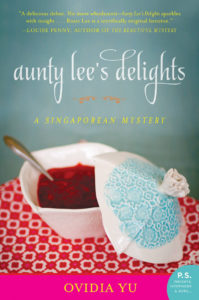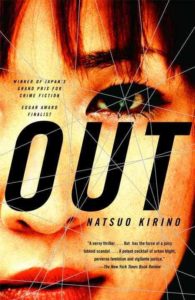The “East Asian detective” or “Oriental sleuth” was a hugely popular character in the Western mystery literature of the early 20th century—think American playwright and author Earl Derr Biggers’s Charlie Chan, who appeared in six novels and over forty films from 1930 to 1950. Or Pulitzer Prize-winner John P. Marquand’s Kentaro Moto, a Japanese secret agent who appeared in six novels published between 1935 and 1957, and was created for the Saturday Evening Post, which was seeking stories with an Asian hero after the death of Biggers. Or Hugh Wiley’s James Lee Wong, known simply as Mr. Wong, who debuted in the pages of Collier’s Magazine in 1934 and starred in a six low-budget films between 1938 and 1940.
The portrayal of Asian characters in those detective stories and the films inspired by them, which more often than not featured white actors in “yellowface” (Warner Oland and Sidney Toler cast as Chan or Peter Lorre as Moto, for example), continue to be a source of controversy today. Despite Biggers’s claim that Chan was created in reaction to anti-Chinese prejudice the author witnessed in California, the character is an amalgam of stereotypes—a portly and effeminate man who spews faux-Confucian aphorisms. “Make no mistake: Charlie Chan is an American stereotype of the Chinaman,” writes Yunte Huang in Charlie Chan: The Untold Story of the Honorable Detective and His Rendezvous with American History. “Anyone who believes that Chan is Chinese would probably also believe that the fortune cookie is a Chinese invention. Charlie Chan is as American as Jack Kerouac, that stalwart of the American hipster who was born French Canadian and spoke the dialect of joual as his first language. Call it the melting pot or the pu pu platter, but Brahmin Boston is where the chop suey of Charlie Chan was first stir-fried by the Harvard-educated Biggers, only to be recast later by wisecracking screenwriters and directors in bronzed and lacquered Hollywood.”
Over the decades, a number of white, often male, authors have created Asian protagonists, many of whom have fallen into the same Orientalist trap: Eliot Pattison’s Beijing Justice Department Investigator Shan Tao Yun, John Burdett’s “philosophical” Royal Thai Police Force detective Sonchai Jitpleecheep, and Colin Cotterill’s French-trained national coroner of Laos Dr. Siri Paiboun. These writers have been criticized for bringing an unmistakably foreign and exoticized take on the countries where their mysteries are set. Brian Thao Worra, an award-winning Laotian American writer, laments that all of Jitpleecheep’s adventures are set in or near Thailand’s red-light districts and feature “lots of exotic deaths and kinky eroticism.”
However, in recent years, more mysteries and thrillers by Asian writers, often first published to wide acclaim in their home countries, have been published in the United States, perhaps due to a desire for a more authentic portrayal of Asians and an increased interest in crime fiction set outside traditional borders. Here is a short introduction to nine Asian authors writing with more intimate knowledge of their identities and settings.

Chan Ho-Kei
The most recent entry on this ever-growing list is Hong Kong author Chan Ho-Kei’s The Borrowed. This episodic puzzle mystery novel is the Soji Shimada Mystery Award (the biggest mystery award in the Chinese-speaking world) winner’s first novel to be translated into English (by Jeremy Tiang) and tells of the escapades of detective Kwan Chun-dok from the perspective of Kwan’s protégé, Inspector Sonny Lok. Each of the six crimes is set against the backdrop of Hong Kong’s historical events, such as the 1967 leftist riot, the 1989 Tiananmen Square Massacre, and the handover of 1997.

F.H. Batacan
Smaller and Smaller Circles won the prestigious Carlos Palanca Memorial Award for Literature in 1999 and is widely regarded as the first Philippine crime novel. In this dark and tightly crafted novel with a strong sense of place, Jesuit priests Fathers Gus Saenz and Jerome Lucero, who the author promises will be recurring characters, hunt for a serial killer who is terrorizing the dump city of Payatas in northern Manila. Batacan herself worked in the intelligence community in Manila, and has suggested in interviews that her frustration with bureaucracy inspired Smaller and Smaller Circles.

Ovidia Yu
A national treasure in Singapore, Yu is a prolific playwright dedicated to writing memorable women characters. Her US publishing debut, a culinary cozy titled Aunty Lee’s Delights, introduced Rosie “Aunty” Lee, a gregarious, nosey Peranakan restaurateur. The second novel in the series, Aunty Lee’s Deadly Specials, is a witty mystery involving buah keluak, a tree nut native to the mangrove swamps of Southeast Asia; the third and most recent, Aunty Lee’s Chilled Revenge, is more sassy and humorous.

Nury Vittachi
Vittachi is the co-founder of the Asia Literary Review and the Hong Kong International Literary Festival, but is best known for his soft-boiled mystery series featuring Singaporean feng shui master C.F. Wong. These comic and gentle novels are most memorable for their quirky cast of characters, including Madame Xu and Dilip Kenneth Sinha, fellow geomancers and psychics, and Joyce McQuinnie, a prim teenager who plays Wong’s “Watson.” His most recent installment is The Feng Shui Detective Goes West.

Shamini Flint
In Flint’s Inspector Singh police procedurals, a bumbling Sikh police inspector traverses Southeast and East Asia (in A Bali Conspiracy Most Foul, The Singapore School of Villainy, and A Deadly Cambodian Crime Spree, among others) and finds himself investigating gruesome murders in the regions’ storied cities. In the series’ latest installment A Frightfully English Execution, lawyer-turned-novelist-and-environmental activist Flint not only successfully explores themes she has in previous novels in the series—political and legal issues in the context of immigration, colonization, and war in Asia—but also elucidates the sense of dislocation that colonized people of the Commonwealth experience on returning to the nation of their colonial masters.

Kishwar Desai
Desai was a print and TV journalist before turning to fiction and her Simran Singh series tackles contemporary feminist and newsworthy concerns in modern India, from female feticide (Witness the Night, which won the 2010 Costa Book Award for Best First Novel and was longlisted for the 2009 Man Asian Literary Prize) to surrogacy and adoption (Origins of Love) and rape (Sea of Innocence). Desai’s sleuth is a maverick social worker and these social justice thrillers lay bare the country’s inequalities and injustices without sacrificing pace or character.

He Jiahong
A professor of criminal law at Renmin University in Beijing, He is the author of several legal thrillers starring a crusading lawyer named Hong Jun, two of which have been translated into English. In He’s latest, Black Holes translated by Emily Jones, Jun deploys his knowledge of criminology and jurisprudence to get to the bottom of miscarriages of justice, and the novels provide tremendous insight into China’s contemporary legal system.

Keigo Higashino
Japanese bestseller Higashino’s Detective Galileo series has been translated and published in the West and stars Dr. Manabu Yukawa, a genius physicist who frequently consults with his university classmate, a Tokyo homicide detective named Kusanagi. These literary thrillers feature Yukawa out-maneuvering and out-thinking the most determined adversaries. The Devotion of Suspect X translated by Alexander O. Smith, which was nominated for the 2012 Edgar Award for Best Novel and the 2012 Barry Award for Best First Novel, is a masterful and terror-full psychological crime thriller.

Natsuo Kirino
Kirino is the godmother of the Japanese female detective novel. Four of her hardboiled/horror novels have been translated to English, several of which feature female detective Miro Murano. Her best-known novel, Out translated by Stephen Snyder, was nominated for the Edgar Award for Best Novel in 2004 and critically engages with a variety of feminist concerns such as gender and work in Japan.

















